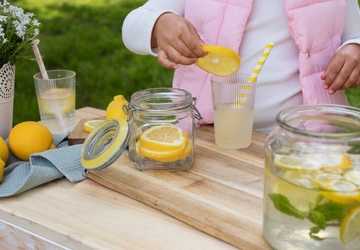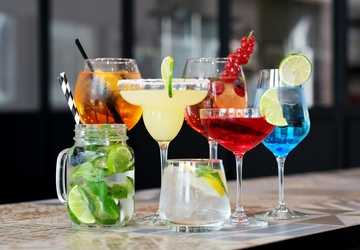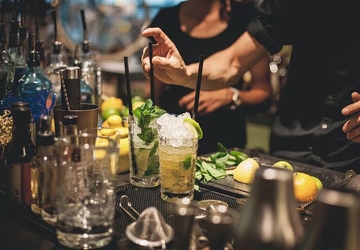How to Concoct Delicious Zero-Waste Cocktails
Cocktails have long been a symbol of celebration and relaxation, but they also come with a hidden cost - waste. From disposable straws to plastic garnishes, the world of mixology can be a surprisingly wasteful one. However, it doesn't have to be this way. By embracing the principles of sustainability and thinking creatively, you can concoct delicious zero-waste cocktails that are not only eco-friendly but also bursting with flavor. In this article, we'll explore some simple yet effective tips and tricks to help you become a zero-waste cocktail aficionado.

Choose Seasonal and Local Ingredients
One of the easiest ways to reduce waste in your cocktail-making is by selecting seasonal and locally sourced ingredients. When you use produce that's in-season, it's not only fresher and more flavorful but also less likely to have traveled long distances, reducing its carbon footprint. Visit your local farmers' market to find a variety of fruits, herbs, and vegetables.
Zero-Waste Citrus
Citrus fruits are a staple in many classic cocktails, but they can generate a significant amount of waste when their peels are discarded. To minimize waste, zest your citrus fruits before juicing them. The zest can be dried and used as a garnish or infused into syrups. For juicing, consider investing in a manual citrus juicer that allows you to extract every last drop of juice without the need for electricity.
Homemade Syrups
Instead of buying pre-packaged syrups, make your own at home. This not only reduces waste but also lets you experiment with unique flavors. To make a simple syrup, mix equal parts of sugar and water in a saucepan and heat until the sugar dissolves. You can then add herbs, fruits, or spices to infuse your syrup with delicious flavors. Once your syrup is ready, store it in a glass container in the refrigerator.
Upcycled Garnishes
Garnishes add that finishing touch to your cocktails, but they are often wasted. Instead of tossing fruit peels or herb stems, consider upcycling them. Fruit peels can be candied or dried to make colorful and tasty garnishes, while herb stems can be infused into syrups or used as stirring sticks.
Use Reusable Straws and Stirrers
The impact of single-use plastic straws on the environment is well-documented. By investing in reusable straws made from materials like stainless steel, bamboo, or glass, you can significantly reduce your cocktail-related waste. Similarly, opt for reusable cocktail stirrers instead of disposable plastic ones.
Repurpose Leftover Ingredients
Sometimes, you'll have leftover bits and pieces of ingredients after making cocktails. Get creative and find ways to repurpose these leftovers. Fruit peels can be used for homemade bitters, and herb stems can infuse oils or vinegar. Reducing waste often requires thinking outside the box.
Batch Cocktails Mindfully
If you're hosting a party or just looking to streamline your cocktail-making process, consider batching your cocktails. However, be mindful of the ingredients you use to minimize waste. Opt for homemade mixes in larger quantities rather than using single-use mixers, allowing you to prepare them in advance and store them in glass bottles.

Reclaimed Glassware
When it comes to serving your zero-waste cocktails, choose reclaimed or vintage glassware. Not only do these items have character and charm, but they also reduce the demand for new glass production. Plus, they make your drinks look stylish and Instagram-worthy.
Use Every Part of the Ingredient
Whether it's a whole fruit or vegetable, a piece of meat, or a cheese rind, strive to use every part of the ingredient. For instance, you can use the whole strawberry, including the leaves, in your cocktail for a unique twist. Lemon peels can be used for garnish, and watermelon rinds can be transformed into pickles to accompany your drink.
Zero-Waste Ice
Ice is a vital component in many cocktails, but traditional ice-making methods can be wasteful. Consider using larger ice cubes or spheres, which melt more slowly, reducing the dilution of your drink. Additionally, invest in reusable silicone ice cube trays or molds instead of disposable plastic ones.
Composting
When all else fails, and you still end up with some waste, composting can be an eco-friendly solution. If you have a garden, composting can turn your cocktail scraps into nutrient-rich soil for your plants. Alternatively, look for community composting programs in your area.
Educate and Inspire
As you embark on your journey to create zero-waste cocktails, share your knowledge and experiences with friends and family. Please encourage them to embrace sustainability in their cocktail-making endeavors. The more people who adopt these practices, the greater the impact on reducing waste in the world of mixology.
Experiment with Zero-Waste Recipes
Now that you have a foundation of zero-waste principles, it's time to experiment with some delicious zero-waste cocktail recipes. Here are a few ideas to get you started:
a. Zero-Waste Mojito:
- 2 oz locally-sourced white rum
- 1 oz homemade mint and lime zest syrup
- 1 oz freshly squeezed lime juice
- Reusable mint garnish
- Reusable metal straw
b. Sustainable Sangria:
- 1 bottle of local red wine
- 2 oz homemade citrus zest syrup
- 1 cup seasonal fruits (e.g., apples, pears, oranges)
- Upcycled fruit peels for garnish
c. Eco-Friendly Margarita:
- 2 oz tequila
- 1 oz homemade jalapeño and lime zest syrup
- 1 oz freshly squeezed lime juice
- Dried lime zest for garnish
- Reusable glassware and straw
Conclusion:
In the world of mixology, where creativity knows no bounds, crafting zero-waste cocktails stands as an inspiring testament to our ability to enjoy life's pleasures while respecting the planet. By embracing sustainable practices, sourcing locally, and upcycling ingredients, we not only reduce waste but also elevate the art of cocktail-making.
Every eco-conscious sip is a toast to our commitment to preserving the environment and cherishing the flavors that nature provides. So, as you embark on your zero-waste cocktail journey, remember that every glass is not just a drink; it's a celebration of sustainability. Cheers to the future!





